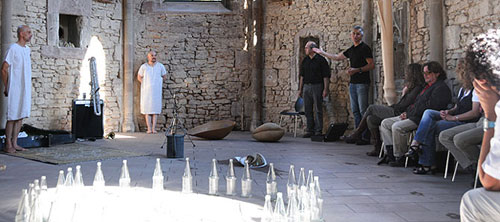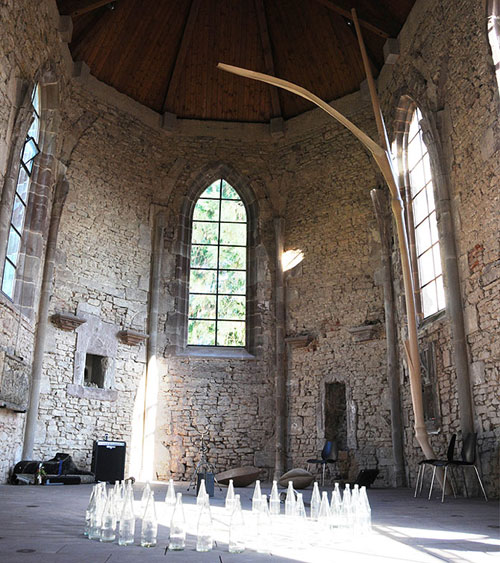Discourse I
September 25, 2011
On the 7th day there was silence. Finally
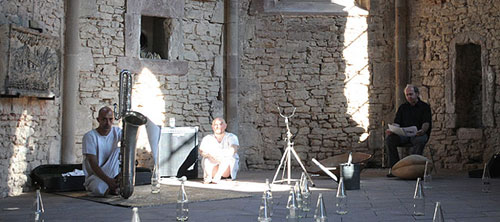
The biblical account of creation sees man's special responsibility for the creation entrusted to him: "God created man, in the divine image, in the image of God they were created, male and female. Then God blessed them, saying to them, "Be fruitful, multiply, fill the earth and possess it." So it happened. And God saw all that he had made, "Look, it is very good." And there was evening, and there was morning: the sixth day."
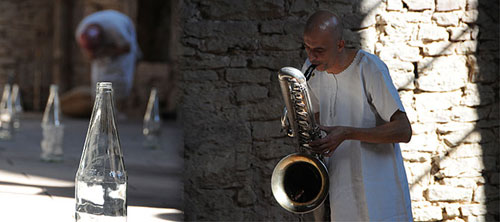
And on the 7th day there was rest. A day to consider to whom the creation goes back. A day to pause. A day to ask ourselves again and again: Have we done justice to the special responsibility? Are we living up to it? The work, "The Limits to Growth", which the sculptor Hermann Bigelmayr created especially for the cultural site Wintringer Chapel, invites us to use the 7th day consciously in this sense. To inquire. To reflect. To pause and look ahead.

On September 25, 2011, the Protestant theologian Josef Jirasek read texts at the cultural site Wintringer Chapel that deal with the mission of creation. A musical performance under the title "Growing" tried to mirror the reading and to make this process perceptible in a compressed form.
Geoffroy Muller | performance artist | trumpet | voice
Hartmut Oßwald | Saxophones | Bass Clarinet | Performance
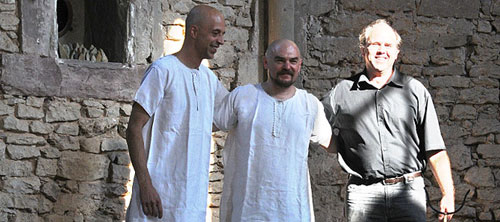
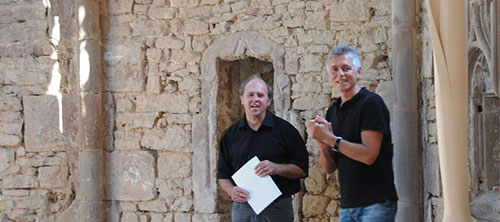
Texts read
A story from the Talmud and questions for us When God created heaven and earth both were equally dear to him. While the heavens sang and praised God's glory, the earth wept. "Did you hear the earth cry? Have you forgotten the dead fish? Did the old tree get in your way? Did you miss the birds? Did you hear the earth cry?" Three reasons were given by the earth for her weeping: "Me," she said, "you keep far from you. while the heavens are near thee and rejoice in the splendor of your glory. Did you come to comfort the earth when violence was done to her? Didst thou shout and reckon the spoils? Did you see how beautiful her old face is full of scratches? Did you show everyone how she shines from the nearness of God? Hast thou come to comfort the earth?" "My food," said the earth, "you gave in the hand of the heavens While the heavens are fed from thy table. Hast thou heard the earth lament? Did you hear the earth speak? Have you understood the language of the earth? Have you listened to the lies of the heavenly death-free? Have you shared the sorrow of the earth?
Jörg Zink
The last seven days of creation
On the morning of the first day ... man decided to be free and good, beautiful and happy. No longer the image of a god, but a man. And because he had to believe something, he believed in freedom and happiness, in numbers and quantities, in the stock market and progress, in planning and his safety. Because for his security he had the ground at his feet filled with missiles and nuclear warheads.
On the second day, the fish died in the industrial waters, the birds died from the powder from the chemical factory destined for the caterpillars, the field hares died from the lead clouds from the road, the lap dogs died from the beautiful red color of the sausage, the herrings died from the oil on the sea and from the garbage on the bottom of the ocean. Because the garbage was active.
On the third day the grass withered in the fields and the leaves on the trees, the moss on the rocks and the flowers in the gardens. For man made the weather himself and distributed the rain according to a precise plan. It was only a small error in the computer that distributed the rain. When they found the error, the barges were lying on the dry bottom of the beautiful Rhine.
On the fourth day, many billions of people perished. Some from the diseases that man had bred, because someone had forgotten to close the containers that were ready for the next war. And their medicines did not help. They had been working for too long in skin creams and pork loins. The others died of hunger because some of them had hidden the key to the grain silos. And they cursed God, who owed them happiness. It was the good Lord after all!
On the fifth day, the last people pressed the red button, because they felt threatened. Fire enveloped the globe, the mountains burned, the seas evaporated, and the concrete skeletons in the cities stood black and smoked. And the angels in heaven saw the blue planet turn red, then dirty brown, and finally ashen gray. And they stopped their singing for ten minutes.
On the sixth day, the light went out. Dust and ash covered the sun, the moon and the stars. And the last cockroach, which had survived in a rocket bunker, perished from the excessive heat, which was not at all good for it.
On the seventh day there was silence. Finally.
Epilogue by Josef Jirasek
I was not prepared for what was happening. All right, my texts were fixed in advance, but beyond that we had only agreed on the sequence of events, when who would be in charge. Nothing more. And then I myself became a spectator at the event, for which I was jointly responsible.
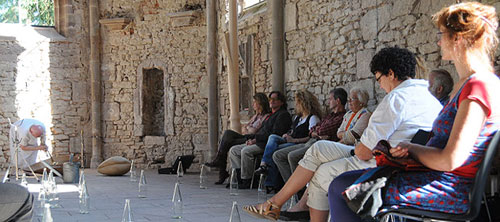
We wanted to show the limits of growth with theological texts and a music performance. To name the dangers of unrestrained abuse of the resources of our planet. But we did not want to stop there, rather we wanted to end with an outlook of hope. Hope in the self-designing powers of nature, but also in the insight of future generations into the necessity of ecological action. My texts should reflect this.
Dorothee Soelle's poem "A Story from the Talmud and Questions for Us" expresses in the first part the despair and anger at the state of earthly creation.
The well-known text by Jörg Zink "The last seven days of creation" warns urgently against unrestrained growth that ignores the future and thus our responsibility for future generations.
The sentences of the Lebanese-American poet Khalil Gibran (1883-1931) from his book "The Prophet" and the Indian wisdom texts linked to it take up this responsibility, which extends beyond the present. For this reason, I have placed them with the second part of the Sölle poem at the end of the reading. As a sign of hope.
But the spoken words only came to life through the musical performance. The babble of voices from the most diverse, no longer identifiable languages reminded us of the futile attempt to be like God: The megalomaniac plan in Babel to build a tower up to heaven was stopped precisely with this. By the confusion of voices, which introduced the chaos and the end of the tower construction.


The improvisations with instrument and the corresponding sounds on the blades of grass sounded like cries of the suffering creation. It also sent shivers down my spine several times in the further course. Then the quiet tones at the end and the symbolic circle: I become aware of what responsibility for creation and acting in solidarity mean. The fact that with the last note and into the silence a dog runs happily tailing into the chapel underlines the statements. Quite involuntarily, because this was not planned by anyone.
Geoffroy and Hartmut, thank you for this impressive experience!
